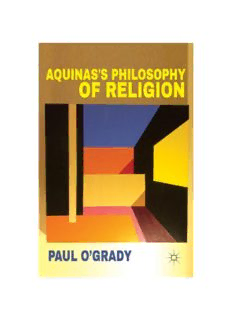
Aquinas's Philosophy of Religion PDF
Preview Aquinas's Philosophy of Religion
Aquinas’s Philosophy of Religion Also by Paul O’Grady RELATIVISM THE CONSOLATIONS OF PHILOSOPHY: Reflections in an economic downturn ( editor ) Aquinas’s Philosophy of Religion Paul O’Grady Trinity College Dublin, Ireland © Paul O’Grady 2014 All rights reserved. No reproduction, copy or transmission of this publication may be made without written permission. No portion of this publication may be reproduced, copied or transmitted save with written permission or in accordance with the provisions of the Copyright, Designs and Patents Act 1988, or under the terms of any licence permitting limited copying issued by the Copyright Licensing Agency, Saffron House, 6–10 Kirby Street, London EC1N 8TS. Any person who does any unauthorized act in relation to this publication may be liable to criminal prosecution and civil claims for damages. The author has asserted his right to be identified as the author of this work in accordance with the Copyright, Designs and Patents Act 1988. First published 2014 by PALGRAVE MACMILLAN Palgrave Macmillan in the UK is an imprint of Macmillan Publishers Limited, registered in England, company number 785998, of Houndmills, Basingstoke, Hampshire RG21 6XS. Palgrave Macmillan in the US is a division of St Martin’s Press LLC, 175 Fifth Avenue, New York, NY 10010. Palgrave Macmillan is the global academic imprint of the above companies and has companies and representatives throughout the world. Palgrave® and Macmillan® are registered trademarks in the United States, the United Kingdom, Europe and other countries ISBN: 978–0–230–28517–0 This book is printed on paper suitable for recycling and made from fully managed and sustained forest sources. Logging, pulping and manufacturing processes are expected to conform to the environmental regulations of the country of origin. A catalogue record for this book is available from the British Library. A catalog record for this book is available from the Library of Congress. To the memory of my father, James O’Grady (1927–2014) Contents Preface and Acknowledgements ix List of Abbreviations xii Conventions in Referring to Aquinas’s Work xiii 1 Philosophy and Theology 1 1.1 Introduction 1 1.2 Characterizing philosophy of religion 3 1.3 Aquinas as a philosopher of religion 8 1.4 Objections to Aquinas’s philosophy of religion 13 2 Aquinas’s contexts 30 2.1 Intellectual context 3 0 2.2 Biographical context 3 6 2.3 Works 3 8 2.4 The conceptual scheme 4 2 3 Reason and Faith 54 3.1 A spectrum of views 5 4 3.2 Reason in Aquinas 6 1 3.3 Faith in Aquinas 6 9 3.4 Assessing Aquinas’s position 7 9 4 Arguments for God’s Existence 87 4.1 Preliminaries 8 7 4 .2 The first way 9 3 4.3 The third way 1 02 4.4 The fifth way 110 5 Objections to God’s Existence 120 5.1 The problem of evil 1 20 5.2 Naturalism 1 39 6 God’s Nature: The Way of Negation 151 6.1 Disputes about God’s nature 1 51 6.2 Divine simplicity 1 61 6.3 Divine eternity 1 74 vii viii Contents 7 God’s Nature: The Way of Eminence 185 7.1 Divine goodness 1 85 7.2 Divine knowledge 1 95 7.3 Divine power 2 05 Notes 2 16 Bibliography 2 25 Index 239 Preface and Acknowledgements Aquinas wrote in a world far removed from the twenty-first century and held many assumptions that few now share. He also wrote a great deal – over 8,500,000 words on a recent estimate [McDermott (1993) p. xv]. He wrote in a distinctive academic style, which can seem remarkably limpid once accustomed to it, but is often rebarbative to new readers. Aquinas, therefore, is a difficult figure to write about. Yet despite these difficulties, I have come to appreciate his manner of thinking and his way of arguing more deeply the longer I engage with his work. There is a robust critical intelligence coupled with a deep religious sensibility evident throughout his writings. And even if one comes to disagree with his views, it becomes clear what the issues are and what the philosoph- ical commitments are which underpin the debate. Aquinas excites strong responses, being sometimes rejected out of hand, sometimes idolized. His own approach is always to seek to under- stand his interlocutor, to give them the strongest case they have, but to assess critically and without prejudice the strength of the view under scrutiny. Aquinas didn’t write in a vacuum, but rather participated in different communities, took part in current debates of the thirteenth century and on occasion wrote at the request of friends and colleagues. Neither did my own writing of this book take place in a vacuum and its immediate spur was teaching philosophy of religion at Trinity College Dublin, wishing there was a book like this available. My predecessor teaching philosophy of religion there, J.C.A. Gaskin, is well known for his book H ume’s Philosophy of Religion. It is a model of clarity and solid information on one of the great figures in the history of the discipline and indispensable for anyone teaching it. It served as an ideal for me as I began to write on one of the other great figures in the history of philosophy of religion. There are different philosophical and intellectual currents behind my writing. In my initial graduate work at University College Dublin I found myself engaging with contemporary analytical philosophy and this led me to Trinity College Dublin to work on Wittgenstein, Carnap and Quine and issues of cognitive relativism – a world far removed from Aquinas in one way, but not in another, as I shall argue in the book. At Trinity I also found a philosophical community distinctive (in Ireland, at the time) for its vigorous atheism. I found myself teaching philosophy ix
Description: